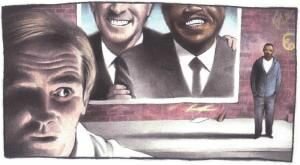Fading black: The diminishing prospects of black politics
Featured — By Nyron N. Crawford on January 19, 2010 at 07:46One of the foreseeable problems for the Twenty-first Century will undoubtedly be that of defending how and why the color line continues to matter in and beyond the illusive “Age of Obama.” Despite the long history of racial suffering that has validated its place in the American conversation, its legitimacy is slowly waning towards an end in an era of wishful ‘post-racialism’. The politics of difference once characterized in strict dichotomized terms, for instance, – Black and White, – is experiencing a new integration that may one day fade from Black.
Simply, owed to the growing diversity in political incorporation coupled with demographic transition, racial politics is evolving insomuch that its changes may highlight a diminished utility for Black politics as an effective curative narrative for its constituent group. In other words, the primary currency in which Black America has long dealt, that of 1960s Civil Rights rhetoric, may prove to be insufficient in the height of Black political empowerment.
Certainly, it would be easy to simply dismiss this prospect, or should it occur, to mistakenly attribute it to the growth of Latinos or to the burgeoning cohort of Black politicians as being unresponsive. Neither, however, seem to fully account for the nuanced shortcomings internal to present-day Black political discourse. In many ways, the reluctance of the Black community and it surrogate leaders to upgrade the rules of engagement for the racial enterprise stagnates its progress.
There are a few examples of dialogue that stand out as perverse in the way they threaten the relevance and sustainability of present-day Black politics. Consider personal responsibility as an example. According to a recent Pew Research Center survey, 52 percent of African American respondents believed that Blacks are mostly responsible for where they fall short in their progress and, expectedly, 70 percent of Whites agreed. Seldom, however, does this translate to an agreeable forum for the Black intellectual elite, who fear that owning too much failure in the struggle potentially makes Blacks liable for their life chances. Personal responsibility, as a result, becomes taboo, the arsenal of Black conservatives, something that is not publicly endorsed as a primary means of survival. As a consequence, tragedy and despair are attributed to systematic failures despite their individual manifestations.
Racial paranoia is another illustration of the legitimacy of race is put to question. Clearly, the venom of racism are alive and well in these United States, but are not necessarily ubiquitous and a part of everything that happens to a person of color. Dr. Boyce Watkins notes it best in suggesting that “In our confusing quest to sort out the devastating impact of 400 years of racial inequality, we now live in a world in which almost any reference to race is at risk of being considered racist.”
There are real problems in the world, and there are cosmetic ones. We all know what happened to the boy who cried wolf; the over reliance on racial cues runs the risk of desensitizing the actual incidence of racism, therefore leading the mass public to disregard it as mere over reaction of a hypersensitive racial group. Of course, this is not always true, but the future of Black politics will begin to depend on choosing the proper and important battles.
Tags: African-Americans, Obama, Politics, racial, Racial Equity, racism, Talking about RaceAuthor: Nyron N. Crawford (2 Articles)
Nyron N. Crawford is a doctoral fellow for the Todd A. Bell National Resource Center on the African American Male, and an American Political Science Association minority fellow in the Department of Political Science at The Ohio State University, where he focuses on identity, judicial and urban politics and policy in the United States. He earned his B.A. from Howard University in 2008.



 Share This
Share This Tweet This
Tweet This Digg This
Digg This Save to delicious
Save to delicious Stumble it
Stumble it





 Did a White Sheriff and district attorney orchestrate a race-based coup in a Northern Louisiana town?
Did a White Sheriff and district attorney orchestrate a race-based coup in a Northern Louisiana town? So how about a little criminal justice?
So how about a little criminal justice? Measuring the progress in native health - life expectancy for Native Americans
Measuring the progress in native health - life expectancy for Native Americans John McWhorter, party of one
John McWhorter, party of one







